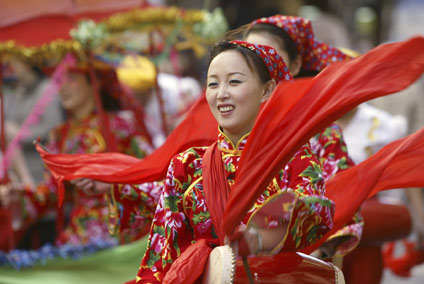Festival hogs the global spotlight
By Li Huizi (China Daily)Updated: 2007-02-15 16:17
Beijing college student Zhou Ji is counting the days before he goes back home to his family in Southwest China's Chongqing.
But the 22-year-old finance major can't think of any particular Spring Festival celebration he enjoys: Firecrackers are dangerous and temple fairs are crowded.
"A big dinner? No, my mother is too tired to prepare one. Too much meat or fish is bad for your health," he said. The family has reserved a table in a restaurant. "I just want to have a good rest after a year of hard work," said Zhou, who is more excited about Christmas and Valentine's Day than the Spring Festival.
More joy overseas
But the traditional Spring Festival is enjoying great popularity overseas. Christian Perlingiere, a Brazilian studying Chinese language, culture and tradition at Georgetown University in the United States, said last year's Chinese New Year celebration was highly publicized and attracted hundreds of people in Sao Paulo, Brazil.
He vividly remembers a parade with a dragon dance, a concert with traditional instruments and delicious niangao New Year cakes made of sticky rice.
Large cities in the United States such as New York, San Francisco and Washington DC also hold Spring Festival events, which are sponsored by China-focused trade organizations or Chinese cultural groups. People enjoy the parades and fireworks, even if they don't really understand the traditions very deeply, said Ryan Paul, an American living in Beijing.
"There is some confusion about what the holiday means and why the date changes every year, but overall, people are intrigued by it," said Paul.
A San Francisco-based website published a list of 2007 Chinese New Year events, sponsored by Southwest Airlines. It includes a Chinese New Year flower market fair, a carnival, a Chinese New Year concert to be staged by the San Francisco Symphony and an "Imperial Dinner" in the San Francisco City Hall.
The annual Miss Chinatown USA Pageant will be held in San Francisco, where Chinese-American women from across the US will compete for the title and an opportunity to win scholarships and become goodwill ambassadors for the Chinese community. The event has been held annually since 1958.
A Chinese New Year Parade, said to be the largest celebration of its kind outside Asia, will also be held in San Francisco.
Li Jialin, who works for an American company in Beijing, saw Lion Dancing for the first time in 1999 in Perth, western Australia, when he was a high school student there.
"I had never seen real, live Lion Dancing before that except on TV, not even in Beijing where I was born," said the young man. He has studied overseas for more than 10 years.
Li said traditional Chinese culture receives special attention during the Spring Festival outside of China. Last year, an Australian telephone company gave every Chinese student in the country a few free minutes to call home from their mobile phones on Spring Festival.
"More foreigners are interested in China because of the country's economic and political rise," said Perlingiere.
A rich tradition
"China is fortunate to have its own rich and unique traditions that have endured millennia. It's a shame that many Chinese today don't take the time to truly admire the magnificence of their culture," said Perlingiere.
As a first-generation Chinese American, Edwin Young, in San Francisco, said his parents still go through all of the rituals of cleaning and decorating the home, preparing delicious food, visiting relatives and worshiping ancestors. But he and his siblings only visit their parents for the Chinese New Year Eve dinner.
"No longer do I get new clothes, new pajamas and new slippers for New Year's day. We also rarely visit other relatives now," said Young.
Last year, the Chinese government proclaimed the Spring Festival an intangible cultural heritage, along with Peking Opera, acupuncture and Shaolin kung fu.
Feng Jicai, an expert on folklore, said old people think the Spring Festival means new clothes, firecrackers and delicious food, but the young take it as an opportunity to relax or travel.
"Life is getting better but also more stressful. People need the psychological comfort of a family reunion during traditional festivals," said Feng.
"Maybe some people don't celebrate with as many colorful decorations as
before, but that's not the best way to measure how important a holiday is to its
people," said Ryan Paul.
|
||
|
||
|
|

